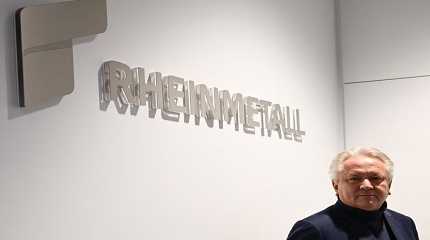
DUESSELDORF, Jan 29 (Reuters) - German arms-maker Rheinmetall is ready to greatly boost the output of tank and artillery munitions to satisfy strong demand in Ukraine and the West, and may start producing HIMARS multiple rocket launchers in Germany, CEO Armin Papperger told Reuters.
He spoke days before Germany's defence industry bosses are due to meet new defence minister Boris Pistorius for the first time, though the exact date has yet to be announced.
With the meeting, Pistorius aims to kick off talks on how to speed up weapons procurement and boost ammunitions supplies in the long term after almost a year of arms donations to Ukraine has depleted the German military's stocks.
Rheinmetall (RHMG.DE) makes a range of defence products but is probably most famous for manufacturing the 120mm gun of the Leopard 2 tank.
"We can produce 240,000 rounds of tank ammunition (120mm) per year, which is more than the entire world needs," Papperger said in an interview with Reuters.
The capacity for the production of 155mm artillery rounds can be ramped up to 450,000 to 500,000 per year, he added, which would make Rheinmetall the biggest producer for both kinds of ammunition.
In 2022, Rheinmetall made some 60,000 to 70,000 rounds each of tank and artillery shells, according to Papperger, who said production could be boosted immediately.
Demand for these munitions has soared since Russia's invasion of Ukraine last February, not only due to their massive use on the battlefield but also as Western militaries backfill their own stocks, bracing for what they see as a heightened threat from Moscow.
Papperger said a new production line for medium calibre ammunition, used by German-built Gepard anti-aircraft tanks in Ukraine for example, would go live by mid-year.
Germany has been trying for months to find new munitions for the Gepard that its own military had decomissioned in 2010.
HIMARS PRODUCTION LINE IN GERMANY?
At the same time, Rheinmetall is in talks with Lockheed Martin(LMT.N), the U.S. company manufacturing the HIMARS (High Mobility Artillery Rocket System) multiple rocket launchers in heavy use with Ukrainian troops, Papperger said.
"At the Munich Security Conference, we aim to strike an agreement with Lockheed Martin to kick off a HIMARS production (in Germany)," he said, referring to an annual gathering of political and defence leaders in mid-February.
"We have the technology for the production of the warheads as well as for the rocket motors - and we have the trucks to mount the launchers upon," Papperger said, adding a deal may prompt investments of several hundred million euros of which Rheinmetall would finance a major part.
Rheinmetall also eyes the operation of a new powder plant, possibly in the eastern German state of Saxony, but the investment of 700 to 800 million euros would have to be footed by the government in Berlin, he said.
"The state has to invest, and we contribute our technological know-how. In return, the state gets a share of the plant and the profits it makes," Papperger suggested.
"This is an investment that is not feasible for the industry on its own. It is an investment into national security, and therefore we need the federal state," he said.
The plant is needed as shortages in the production of special powders could turn out to be a bottleneck, hampering efforts to boost the output of tank and artillery shells, he noted.
A few days before the meeting with the new defence minister, Papperger pushed for an increase of Germany's defence budget.
"The 51 billion euros in the defence budget will not suffice to purchase everything that is needed. And the money in the 100 billion euro special funds has already been earmarked - and partially been eaten up by inflation," he said.
"100 billion euros sounds like a giant sum but we would actually need a 300 billion euro package to order everything that's needed," he added, noting that the 100 billion special fund does not include ammunitions purchases.
Even before Russia's invasion of Ukraine, Germany was 20 billion euros short of reaching NATO's target for ammunitions stockpiling, according to a defence source.
To plug the munitions gap alone, Papperger estimates the Bundeswehr (German armed forces) would need to invest three to four billion euros per year.
In the talks with the minister, the defence boss hopes for a turn towards a more sustainable long-term planning in German procurement, stretching several years into the future, as the industry needed to be able to make its arrangements in time.
"What we are doing at the moment is actually war stocking: Last year, we prefinanced 600 to 700 million euros for goods," Papperger said. "We must move away from this crisis management - it is crisis management when you buy (raw materials and other things) without having a contract - and get into a regular routine."




